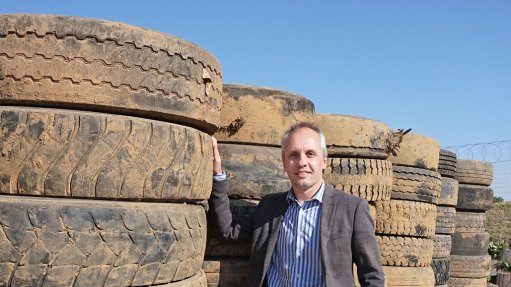
Mathe Group and recycled rubber flooring company Van Dyck CEO Dr Mehran Zarrebini
Radial truck tyre recycling company Mathe Group has received a new waste management licence for a new R65-million tyre recycling facility and negotiations with a potential funder are well under way, said Mathe Group and recycled rubber flooring company Van Dyck CEO Dr Mehran Zarrebini.
The facility will be positioned alongside its existing operation in Hammarsdale, KwaZulu-Natal, and the precise value of the investment will depend on the technology sourced.
Further, the expansion of its existing facility will come on stream in August and will increase Mathe Group’s current output from between 25 t and 30 t of rubber crumb to 45 t, as well as grow the number of tyres recycled from 700 radial truck tyres a day to about 1 000 a day.
Additionally, Van Dyck, which produces rubber goods from recycled rubber crumb, will start a moulding capacity expansion during this month.
The flooring market in South Africa has suffered a significant decline in volume over the years as a result of challenging economic conditions in South Africa. Complementary and/or substitute products have largely replaced soft flooring in many residential and commercial properties, said Zarrebini.
Van Dyck, which was originally a carpeting manufacturer, pivoted away from soft flooring to rubber-based products during the Covid-19 period and has become known as a flooring innovator within a short space of time. Recycled rubber flooring presents significant entrepreneurial opportunities, he added.
“Recycling tyres is not only good for the environment, but provides immense socio-economic value. For the end-user, incorporating recycled rubber flooring into a gym installation, for instance, not only provides comfort to the end-user but also enhances acoustic performance and eliminates noise pollution. Our products are manufactured in a sustainable manner and hence we have attained global green tag certification.”
Currently, the pile of waste tyres is growing in South Africa, but it continues to import virgin rubber for the manufacture of a variety of products. As tyres are largely composed of rubber, when they are discarded, the potentially valuable rubber often goes to waste.
Tyre recycling reduces the need for imported rubber by creating a greater and sustainable supply of reusable rubber from within South Africa’s own waste streams, lessening the need to import new rubber.
Thus, recycling can contribute to a more circular economy where waste is minimised and resources are used more effectively. This will reduce the high cost of both purchasing and transporting new rubber from international suppliers, said Zarrebini.
“We have seen huge growth in the production of moulded products which has required the purchase of additional moulding capacity to cater for existing market requirements and anticipated future growth.
“Our production facility is now operating 24/7 at full capacity despite the interruptions of loadshedding. The new equipment that will arrive will enable our operations to double capacity of certain moulded products,” he said.
Most of the growth in moulded products has come from South Africa and the UK to which Van Dyck exports gym flooring, acoustic shock pads and acoustic cradles.
“We have also completed projects in Rwanda, Uganda and Kenya with our locally manufactured acoustic underlays, which are used underneath carpeting in the hospitality sector,” Zarrebini noted.